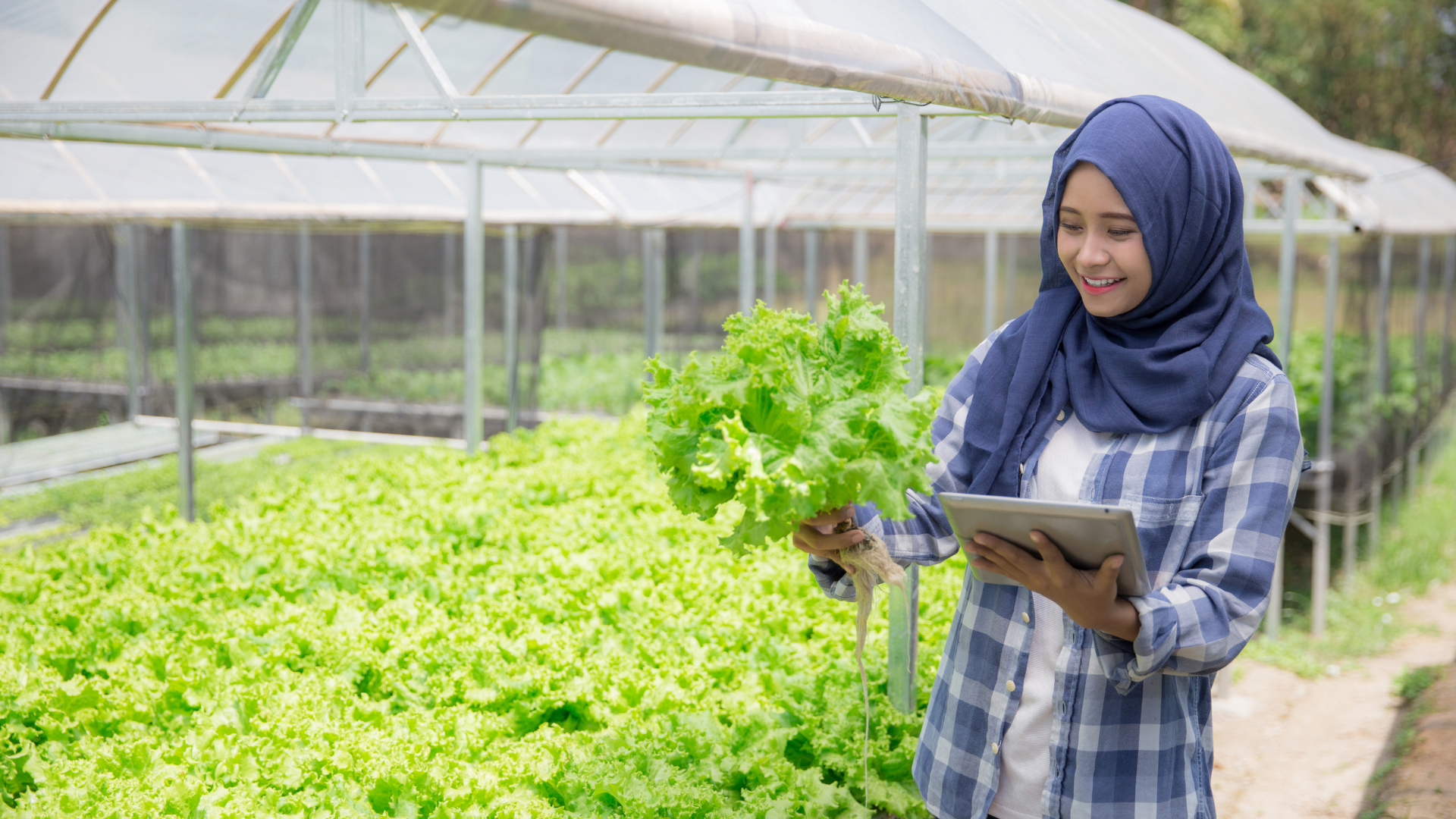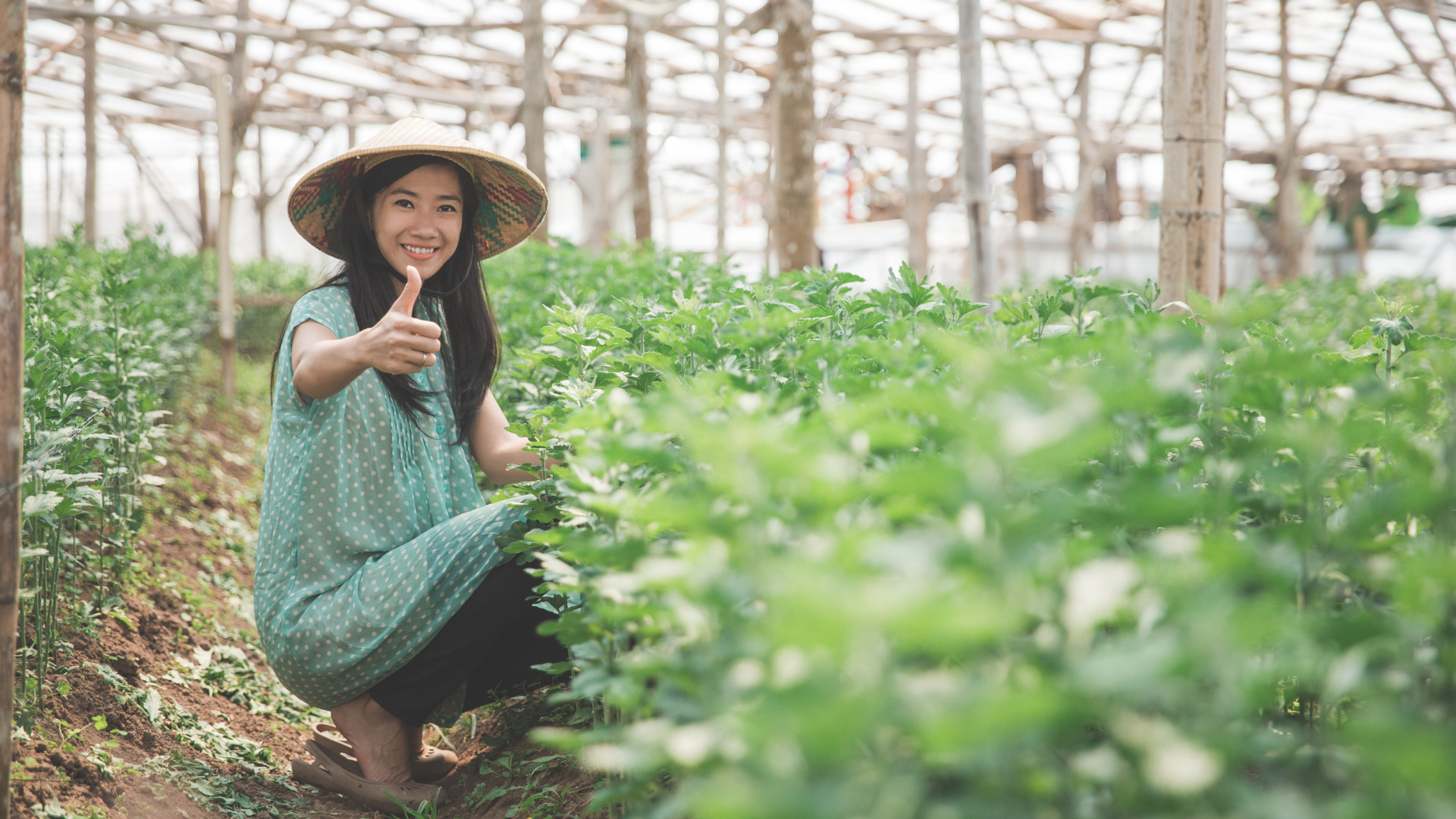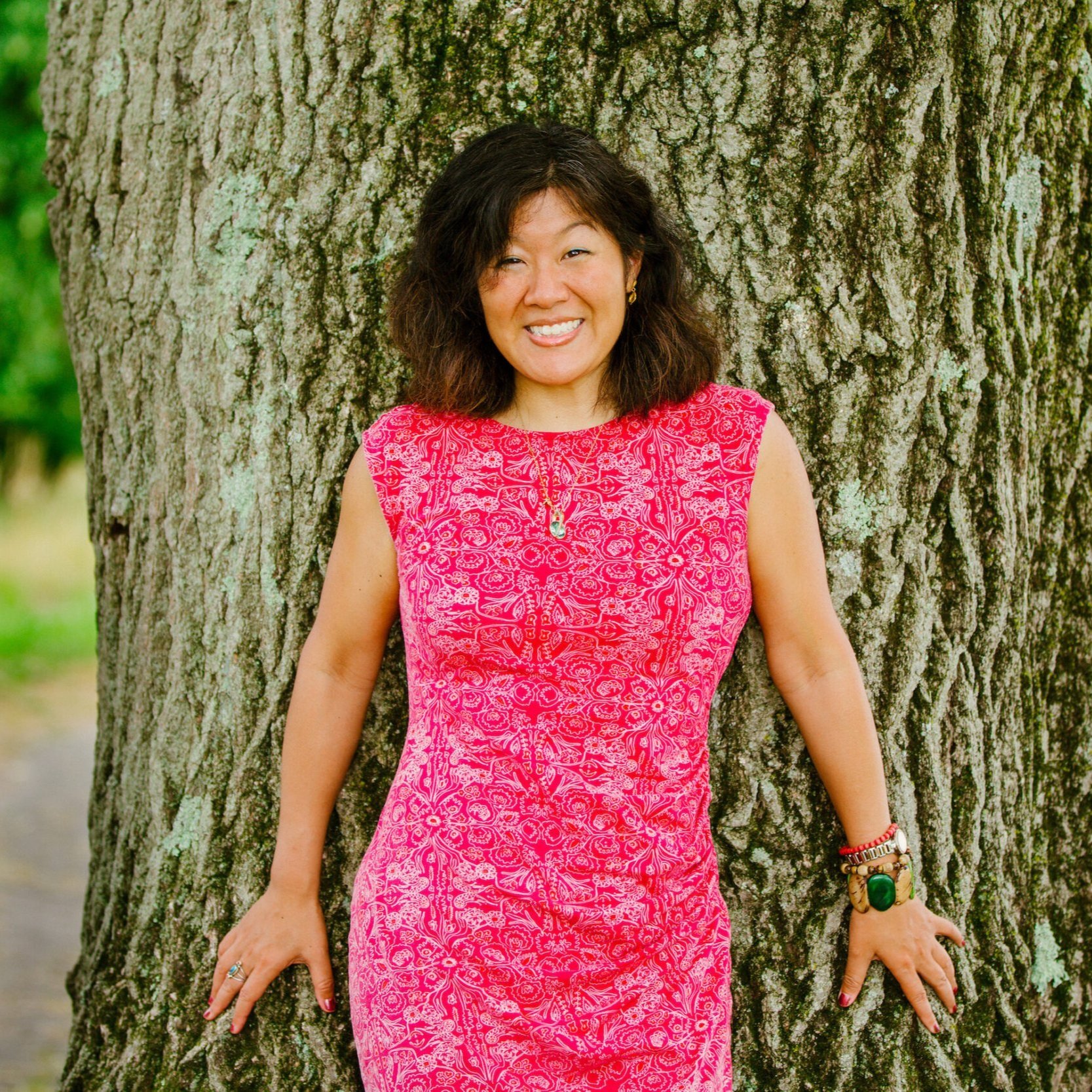Nov 1, 2021
16 Women You Should Know Who Are Creating A More Sustainable Food System
.png)
Editor’s Note: The following list details some of the many women leading the charge in the agricultural industry. As there are numerous women in agriculture around the world specializing in technology, operations, business development, and more, this list is not exhaustive but rather meant to illustrate the variety of ways in which women are creatively solving the world’s food crisis.
Women have long been the cornerstone of the global agricultural industry.
.png)
On average, according to the U.N. Food and Agriculture Organization (FAO), women make up 43% of the agricultural workforce and 47% of the global fisheries labor force. In the United States, according to the USDA’s 2012 Census of Agriculture, nearly 1 million women are working America’s lands. Representing nearly a third of the nation’s farmers, these women generate over $12.9 billion in annual agricultural sales.
Yet, in the 2020 Global CEA Census, we found that only 28% of respondents were female founders (and just 15% in our 2019 report).
Regardless of their geographic location, gender-specific restrictions and challenges put female farmers at a disadvantage. We rarely see female agribusiness founders or women in agriculture in positions of power.
Why is this the case and why is it important?
According to the World Economic Forum, less than 20% of landholders are women. And, in some parts of the world, women still cannot legally own or control land. This makes it difficult for women to enter contract farming agreements that could provide higher earnings and reliable sources of income.
There is a crop yield gap of about 20-30% between male and female farmers due largely to differential access to resources and inputs. FAO estimates that if female farmers had the same access to resources as men, 150 million people could be lifted out of poverty.
Smallholder female farmers in low-income countries face challenges with borrowing money. Without adequate funds for capital investments, they’re less likely than men to buy and use fertilizer, drought-resistant seeds, use sustainable agricultural practices, and other advanced farming tools and techniques that increase crop yields.
Project Drawdown’s estimates show that allowing women more equal participation in agriculture could prevent 2.06 gigatons of carbon from entering the atmosphere by 2050.
LettUs Grow recently published an article diving deeper into these statistics. Read the full article to learn more about gender inequalities in agriculture and the vertical farming industry.
Today, we’re seeing more interest than ever before in urban agriculture and controlled environment agriculture (CEA) amongst women. As can be seen in the chart to the right, the percentage of female visitors to Agritecture’s website has been steadily increasing each year, from just 35% of total visitors in 2017 to 45% in 2021.
Here is a list of 16 women fighting through these numerous challenges to create a more sustainable and equitable agricultural industry:

Alyssa Whitcraft is using Earth observation data to aid better agricultural decision-making
As part of NASA Harvest’s mission to “enable and advance adoption of satellite Earth observations to benefit food security, agriculture, and human and environmental resiliency,” Whitcraft both manges large, multinational programs and does applications research via Earth observation data in the remote sensing of agriculture to enable better decision-making in agricultural land use, productivity, and sustainability.

Her Excellency Mariam Almheiri is making a desert more food-secure
With her varied interests in environmental protection and food security, Her Excellency was previously part of the Emirati Ministry of Environment and Water, where she was involved in the Khalifa Bin Zayed Centre for Marine Research, and the UAE Integrated Waste Management Project. During this time, she also led the creation of a national strategy to raise environmental awareness in the UAE.
Since being appointed as Minister of State for Food Security in October 2017, Her Excellency has launched the UAE Food Security Strategy and announced plans for 'Food Valley,' the UAE’s own food technology hub.

Katherine Soll is empowering a food-secure generation
Soll founded Teens for Food Justice (TFFJ) in response to her growing dismay and alarm as New York City gentrified over the course of her lifetime and basic resources became less and less available in lower-income communities, particularly good quality, healthy food.
With the firm belief that the young can transform the inequitable agricultural system if given the right resources, TFFJ not only provides free produce to food-insecure communities, they also empower teens to learn about agriculture - “how to build and manage hydroponic farms - high capacity vertical hydroponic farms within their schools, that are able to grow thousands of pounds of fresh produce annually.”

Karen Washington is advocating for black farmers and black leadership in the food movement
As “urban farming’s de facto godmother,” Karen Washington has been battling for food justice for over three decades now. Not only is she the Co-Founder of Black Urban Growers (BUGS), an organization supporting Black growers in both urban and rural settings, she is also a community gardener and board member of the New York Botanical Gardens, former president of the New York City Community Garden Coalition, Co-Founder of the La Familia Verde Garden Coalition, and Co-Owner and organic grower at Rise & Root Farm.
With her varied food advocacy efforts throughout the United States, Washington is working to redefine the challenges that the food system faces to create a more inclusive food community.

Christine Gould is accelerating next-gen innovation in food & agriculture
As a global leader in agri-food-tech innovation, Gould was invited by the UN Deputy Secretary-General to serve on the Advisory Committee for the UN Food Systems Summit. Today, through TFF, she offers a unique innovation engine that empowers both millennial and GenZ talents to create new ideas and solutions to the global food crisis, supporting these ventures at every stage – from ideation through to investment.

Nona Yehia is creating a more inclusive food system for those with developmental disabilities
As a forward-thinking entrepreneur, Nona Yehia helped build the first vertical hydroponic greenhouse in the world, Vertical Harvest. She uses her passion for local food and experiences to coach Vertical Harvest to success and continues to lead the company in bringing architectural, economic, and social innovation to communities nationwide. She prioritizes serving underserved populations like community members with developmental disabilities (such as those with Autism and Down Syndrome) by helping them find meaningful work and upwardly mobile career opportunities in urban agriculture.

Elise H. Golan is encouraging a more sustainable agricultural industry
As the Director for Sustainable Development for the USDA, Golan oversees the Department's various policies, programs and activities that impact and relate to sustainable agricultural, natural resource, and community development including food security.
Dr. Golan’s research has spanned a wide range of sustainability issues, including land tenure and sustainable land management; regional and U.S. food-system modeling; food labeling and market development; food access, affordability, and security; and the distributional consequences of food policy.

Meiny Prins is promoting business sustainability in horticulture
Prins devotes herself to promoting business sustainability and the international development of sustainable solutions in the horticultural business and the built environment. She started the ‘Sustainable Urban Delta’ initiative in 2014 to better integrate green belts into urban areas and create exciting new opportunities on a social, ecological and economic level.
In her position of CEO of Priva Solutions, she was proclaimed Business Woman of the Year. In 2009, Priva was awarded with the first CleanTech Star of WWF (World Wildlife Fund).

Yemi Amu is leading aquaponics and circular farming education
Yemi Amu established NYC’s first and only publicly accessible outdoor aquaponics farm, Oko Urban Farms, in 2013. With her decade-long experience of facilitating the creation and maintenance of over 20 edible spaces throughout NYC, she now directs all of Oko Farms' programs including education, design/build projects and community related activities, integrating various culinary, nutrition and gardening programs for both youth and adults, and promoting aquaponics as a tool for environmental awareness and stewardship.

Marni Karlin is creating a healthier food system through strategic planning and policy
Previously serving as the Executive Director of the CEA Food Safety Coalition, Karlin enabled the development of the leading food safety standards for the CEA leafy greens industry, alongside managing day-to-day operations and leading all communications and advocacy work. Today, Karlin works as the USDA’s Senior Advisor for Organic and Emerging Markets, furthering food safety within the agricultural system through advocacy, strategic planning, law, and policy.

Claudia S. Ondo is reconnecting African communities with locally-grown food
Former Agritecture client, Claudia S. Ondo, Owner & General Manager at La Ferme Urbaine Okoume, built a hydroponic microfarm in her native country of Gabon to take a technology-led approach to feeding the country. Working with Agritecture & The World Bank, Ondo’s farm now produces an astonishing 300 lettuces and herbs per week. She furthers her mission by forming a stronger relationship between the Gabonese people and urban agriculture through hosting viewings and workshops for the community.

Jade Stinson is taking a data-driven approach to seed design
As the Co-founder and President at Vindara, acquired by Kalera, Stinson led the development of the first seeds specifically designed for use in controlled environment operations. Her work removes the limitations that traditional seeds impose for growers, retailers, and consumers, giving them even greater control over their produce. Dr. Stinson’s professional focus is to discover, launch, and accelerate the scientific foundation of high impact and transformative agricultural technologies.

Robynne Anderson is bringing the voice of agriculturalists into multi-governmental processes
With her extensive experience in the agriculture and food sector, Robynne Anderson represents accredited organizations at the United Nations, speaking on agriculture and food issues. Over the years, she has worked with both farm organisations to further the voice of agriculture in the food debate, and Fortune 500 companies to grow worldwide businesses. She broke new ground in bringing new issues to prominence in the international policy fora, such as the role of women in farming, Voluntary Guidelines on Land Tenure, the importance of post-harvest losses and food waste in food security.

Tinia Pina is furthering a closed-loop food system
As the Founder & CEO of Re-Nuble, a for-profit social enterprise and agricultural technology company, Pina works to use organic cycling science™ technology to transform unrecoverable vegetative food byproducts into a platform of sustainable technologies for indoor farms. In helping to support more circular farming, the company transforms unrecoverable food byproducts into water-soluble organic hydroponic nutrients and grow substrates while eliminating landfill waste and greenhouse gases.

Sami Tellatin is unlocking funding for farmers
As COO and Co-Founder of FarmRaise, one of three official Agritecture financing partners, Sami Tellatin equips farmers with public and private capital to make on-farm improvements, cataloging each farmer's unique options & simplifying the application process. Through this platform, which is a one-stop-shop to help farmers apply for loans and grants for which they’re qualified, she supports farmers in accessing the right funding to innovate and redefine the food system.

Amy Wu is spotlighting female agricultural innovators
As an award-winning writer for the women’s ag and agtech movement, Amy Wu’s Farms to Incubators blog, documentary, and movement spotlights female entrepreneurs to inspire more youth/next generation, especially women, to consider the vast opportunities in agtech. Through using storytelling to amplify the voices of women leaders and entrepreneurs, Wu has created a community and network for women in agtech to connect and support each other in their endeavors.



